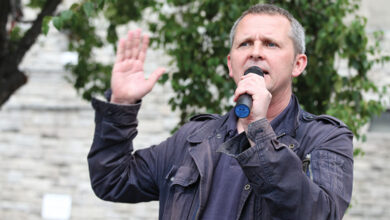Time for a growth plan
 ICTU’s Macdara Doyle argues that austerity has failed Ireland and urges the troika to open its eyes to the country’s economic predicament.
ICTU’s Macdara Doyle argues that austerity has failed Ireland and urges the troika to open its eyes to the country’s economic predicament.
Speaking recently in Dublin, Mr István Székely, the European Commission representative in the troika, issued a plaintive public appeal for proof that austerity was killing the Irish economy, not curing it.
Speaking at a press conference held just before the troika departed Dublin for less austere climes, Mr Székely asked “everyone to bring up evidence because this discussion should be evidence-based and not on beliefs and definitely not driven by things other than this … it should help people who need help because they are unemployed or they are vulnerable and we will engage in this discussion and we will try our best to improve things if they need to be improved or take measures if more measures are needed.”
He went on: “We will work together with everyone to find solutions to difficult problems in relation to issues such as unemployment and the vulnerable.”
Problem solved then. Not really. The very serious problem revealed by this utterance is not Mr Székely’s stated determination to help all who need help, rather it is the fact that he has asked for hard evidence of the existence of these problems in the first place.
Had he escaped – even for a short while – the lush environs of Dublin’s Merrion Hotel and strolled the streets of the capital city, it is unlikely that Mr Székely would have felt the need to issue his public appeal at the press conference.
Shops closed and boarded on every street, ‘sale’ signs in too many of the remaining outlets; the visible manifestations of a 25 per cent drop in domestic demand since 2008. No other country has experienced such a collapse in post-war European history.
And had Mr Székely wandered further, perhaps as far as the suburbs, he would have seen the half-finished ghost estates and the ‘homes’ that many were duped into buying by banks desperate to lend and bloated beyond all recognition by unlimited credit from abroad.
Perchance he might also have come across just one of the many of 440,000 plus people now jobless and dependent on social welfare to survive, the same people who have to be ‘incentivised’ to work in jobs that do not exist, by way of social welfare cuts and cuts in already low wages.
The obvious contradiction in that last initiative appears to have bypassed Mr Székely and his colleagues in the troika. How does cutting already low pay incentivise people into work?
In truth, the man from the EU Commission who denies all knowledge of a crisis that hides in plain sight is like someone in a burning building who wonders aloud why people are rushing about with buckets of water.
And in reality, the officials from the troika don’t even need to walk the streets in search of evidence. Even the dry statistics that the Irish Government is required to regularly feed into the ‘bailout process’ provide evidence enough of the damage done.
Every indicator points in exactly the wrong direction, in exactly the opposite direction to what the EU authorities promised it would be, if we embraced austerity. Embrace it we did and we are now worse off than before and, with each passing day, our capacity to recover is diminished further.
The problem for the troika and the institutions that they represent – particularly the ECB and the European Commission – is that they cannot possibly concede the fact that austerity has failed in Ireland.
Because that would mean that it cannot work elsewhere. And that would require a rejection of plan A and the development of plan B (provisionally titled ‘A Plan for Growth’).
When France and several other countries suffered a ratings downgrade recently, the agency in question (Standard & Poor’s) noted that synchronised austerity across the EU was collapsing domestic demand and had become ‘self-defeating’.
More recently, the head of the IMF Christine Lagarde added her voice to this growing chorus of gentle dissent, by pointing out that Europe’s big failing was the absence of a plan for growth.
Perhaps both should make contact with Mr Székely, because they have obviously come across precisely the sort of evidence that he has asked to see.





